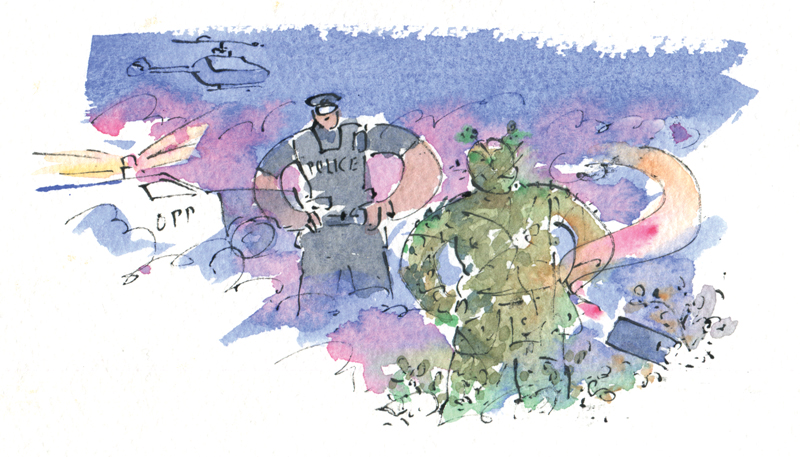Peter Cannon of Paisley, Ont., has a story about a 1983 summer exercise with the Grey and Simcoe Foresters, which was staged at a farm owned by one of the regiment’s senior non-commissioned officers (NCOs).
The unit was to practise defensive measures and repulsing attacks. On arrival, they dug slit trenches and strung concertina and low wire entanglements before getting their heads down. “I’m in my hooch enjoying the best 15-minute-long sleep of my life until those of us sleeping are woken to ‘Stand to!’ at approximately 0200,” reported Cannon.
It turned out that no one had thought to inform the local authorities about the exercise.
A firefight develops with blanks, Thunderflashes and artillery sims. The battle dragged on until about 5 a.m. when people saw a column of lights headed for the property.
It turned out that no one had thought to inform the local authorities about the exercise, and the neighbours had been telling the Ontario Provincial Police about a small war on the farm. The police responded in full force.
“I remember looking at my trench mate Joe Vella and saying to him, ‘This can’t be good,’ before we both broke out laughing hysterically as our instructors, the enemy force, were yelling, ‘Cease fire.’”
The instructors and senior NCOs huddled with the police, who were not amused.
“I would have loved to be a fly on the wall when that ball of…rolled uphill from our course commander to the sir that was supposed to do the notifying, to the CO and back down to that specific sir,” said Cannon.
Ahh, to be a private who can’t be blamed.
Gary Nickel, a Royal Canadian Legion member at Fort Saskatchewan, Alta., was a padre in various western branches for 33 years.
He was a civilian officiating clergy (COC) and at one point found himself at Wainwright in southern Alberta.
One evening he was having a post-dinner stroll and chat with an NCO.
“Suddenly, from the perimeter, the call was yelled, ‘Sergeaaaant!’” said Nickel.
He and his companion headed in the direction of the shout. The alarmed soldier then hollered that a pair of eyes was staring at him from the darkness outside the area.
A quick glance identified the culprit, a curious coyote whose eyes reflected the camp lights.
“As we walked back,” reported Nickel, “someone muttered ‘city boy.’”
Valerie Fieber of Charlie Lake, B.C., remembers a tale from her husband’s Uncle John, a Second World War paratrooper.
“He made 62 jumps and 61 of them he was pushed out!” recalled Fieber. “Jumping out of the plane was something he did not like. The last time, he said he was waiting by the open door and he accidentally fell out.”
John P. Maclean was a Second World War vet and also served as a public affairs officer with the Canadian army in Korea. He had some great tales, including the story of his first night at the Correspondents’ Club in Tokyo in 1951.
He was wearing strange gear, including a British khaki shirt with his 1939-45 ribbons, Canada shoulder flashes and the two pips of a first lieutenant. He sported a handlebar mustache and topped the ensemble with his old Irish Regiment of Canada green beret with a light blue hackle.
As he nursed a drink, an American colonel loomed out of the semi-darkness and told him a general wanted to buy him a drink. Confused, but curious, Maclean joined the general. It turned out that in his unusual outfit, Maclean had been mistaken for a Turkish two-star general attached to the Commonwealth Brigade.
Once it was determined he was neither a Turk nor a general, his American host turned to other matters. He wanted the Canadians to get more coverage.
“We Americans are getting all the credit over here,” the general told Maclean. “Which is true, but not good. You and the other Allies are getting nothing. I will show you how to do it.”
The next morning, Maclean was ushered into the general’s office.
“Your PR delivery is screwed up,” the American said. “Your stuff seems to be going from the front by pack mule, by boat to Japan, by rickshaw to your diplomatic people, by bag to Ottawa, maybe a censor, to Canadian Press somehow in Toronto.
“Set it up properly. I’ll OK it. Jeep to Seoul. Jet to Japan. Courier to you. Down the hall to the censors. Radio to San Francisco and wire to CP Toronto.”
Maclean said that with this system and the time difference, stories could sometimes make the next day’s newspapers in Canada, much to the delight of the Defence Department and the minister.
A friend assured me this occurred one day at a flight training base. A student pilot, flying solo, was apparently having some problems and had the transmit switch open. Suddenly, the airwaves were filled with ripe profanity, ending with “I’m fucked up.”
The tower came on quickly. “Aircraft using profanity, identify yourself.”
There was a pause before the reply: “I’m not that fucked up.”
Do you have a funny and true tale from Canada’s military culture? Send your story to magazine@legion.ca
Advertisement






















